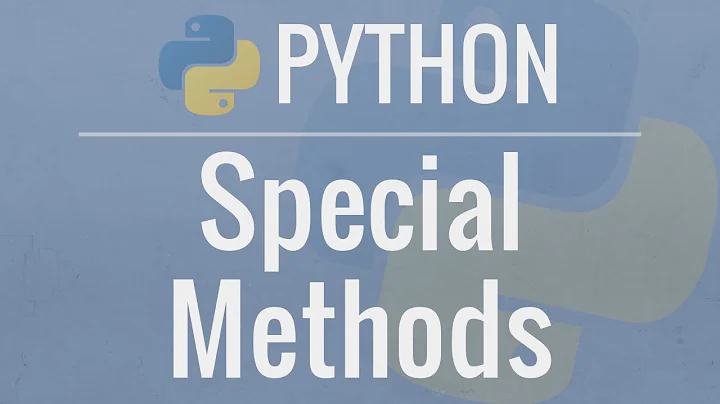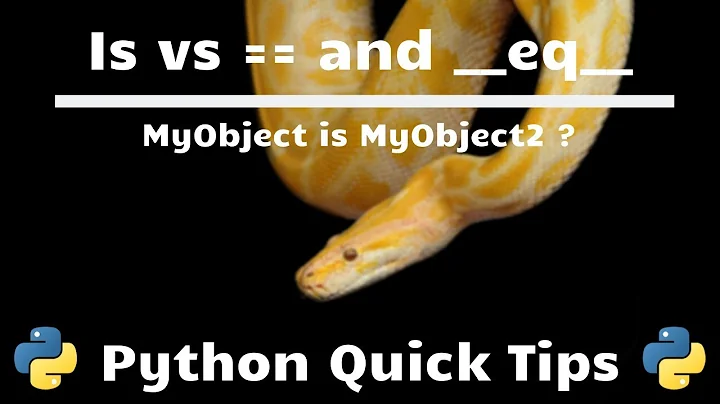Python: Is this an ok way of overriding __eq__ and __hash__?
The first one is fine. The second one is problematic for two reasons:
- there might be duplicates in
.courses - two entities with identical
.coursesbut different.forwardLinkswould compare equal but have different hashes
I would fix the second one by making equality depend on both courses and forward links, but both changes to sets (hence no duplicates), and the same for hashing. I.e.:
def __eq__(self, other):
if not isinstance(other, DependencyArcTail):
return False
return (set(self.courses) == set(other.courses) and
set(self.forwardLinks) == set(other.forwardLinks))
def __hash__(self):
return hash((frozenset(self.courses), frozenset(self.forwardLinks)))
This of course is assuming that the forward links are crucial to an object's "real value", otherwise they should be omitted from both __eq__ and __hash__.
Edit: removed from __hash__ calls to tuple which were at best redundant (and possibly damaging, as suggested by a comment by @Mark [[tx!!!]]); changed set to frozenset in the hashing, as suggested by a comment by @Phillips [[tx!!!]].
Related videos on Youtube
Nick Heiner
JS enthusiast by day, horse mask enthusiast by night. Talks I've Done
Updated on July 09, 2022Comments
-
 Nick Heiner almost 2 years
Nick Heiner almost 2 yearsI'm new to Python, and I wanted to make sure that I overrode
__eq__and__hash__correctly, so as not to cause painful errors later:(I'm using Google App Engine.)
class Course(db.Model): dept_code = db.StringProperty() number = db.IntegerProperty() title = db.StringProperty() raw_pre_reqs = db.StringProperty(multiline=True) original_description = db.StringProperty() def getPreReqs(self): return pickle.loads(str(self.raw_pre_reqs)) def __repr__(self): title_msg = self.title if self.title else "Untitled" return "%s %s: %s" % (self.dept_code, self.number, title_msg) def __attrs(self): return (self.dept_code, self.number, self.title, self.raw_pre_reqs, self.original_description) def __eq__(self, other): return isinstance(other, Course) and self.__attrs() == other.__attrs() def __hash__(self): return hash(self.__attrs())A slightly more complicated type:
class DependencyArcTail(db.Model): ''' A list of courses that is a pre-req for something else ''' courses = db.ListProperty(db.Key) ''' a list of heads that reference this one ''' forwardLinks = db.ListProperty(db.Key) def __repr__(self): return "DepArcTail %d: courses='%s' forwardLinks='%s'" % (id(self), getReprOfKeys(self.courses), getIdOfKeys(self.forwardLinks)) def __eq__(self, other): if not isinstance(other, DependencyArcTail): return False for this_course in self.courses: if not (this_course in other.courses): return False for other_course in other.courses: if not (other_course in self.courses): return False return True def __hash__(self): return hash((tuple(self.courses), tuple(self.forwardLinks)))Everything look good?
Updated to reflect @Alex's comments
class DependencyArcTail(db.Model): ''' A list of courses that is a pre-req for something else ''' courses = db.ListProperty(db.Key) ''' a list of heads that reference this one ''' forwardLinks = db.ListProperty(db.Key) def __repr__(self): return "DepArcTail %d: courses='%s' forwardLinks='%s'" % (id(self), getReprOfKeys(self.courses), getIdOfKeys(self.forwardLinks)) def __eq__(self, other): return isinstance(other, DependencyArcTail) and set(self.courses) == set(other.courses) and set(self.forwardLinks) == set(other.forwardLinks) def __hash__(self): return hash((tuple(self.courses), tuple(self.forwardLinks))) -
Mark Dickinson about 14 years@Alex: doesn't that hash depend on the order of the elements in
tuple(set(self.courses)), which might be somewhat arbitrary? -
Alex Martelli about 14 years@Mark, it's arbitrary but not capricious -- though I'm not 100% sure that arbitrarily shuffled lists with the same items would produce the same-ordered set (it may vary with versions of Python), so it's best to avoid the
tuplecalls I lazily left in -- let me edit accordingly, thanks. -
Philipp about 14 yearsI think you should use
frozensetinstead ofset, the latter being unhashable. -
 Alex Punnen over 8 yearswhen you override equal to should not you recommend the not equal to part be also overridden for consistent behavior stackoverflow.com/questions/390250/… ?
Alex Punnen over 8 yearswhen you override equal to should not you recommend the not equal to part be also overridden for consistent behavior stackoverflow.com/questions/390250/… ? -
 Guy almost 8 yearsThis is an incomplete answer. Please check here. Few points: 1. You should implement
Guy almost 8 yearsThis is an incomplete answer. Please check here. Few points: 1. You should implement__ne__(and probably use total_ordering. 2. When you don't know how to equal, you should returnNotImplemented












![[Python Programing] - Lesson 5: Python Exceptions Handling](https://i.ytimg.com/vi/L-UB2pfDI8c/hq720.jpg?sqp=-oaymwEcCNAFEJQDSFXyq4qpAw4IARUAAIhCGAFwAcABBg==&rs=AOn4CLCAWZbvy8nPHO37b3GAyGPDmLaGQg)

